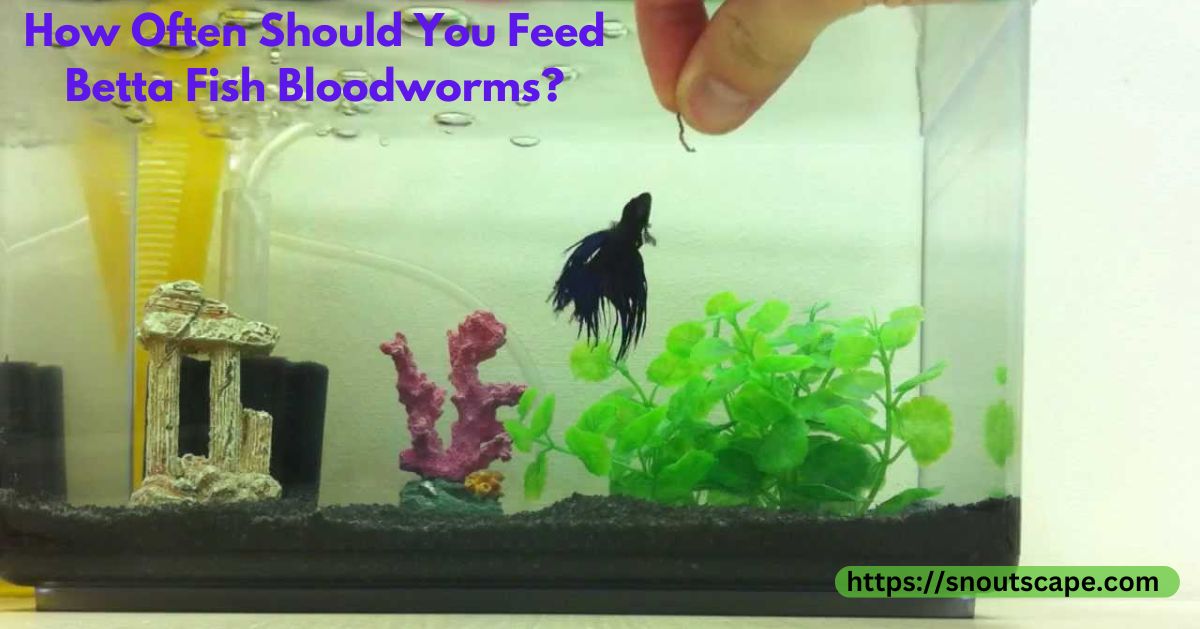Betta fish are one of the most popular pets for aquarium enthusiasts. Their vibrant colors and lively personalities make them a favorite choice. Proper nutrition is key to keeping your Betta healthy and happy. A popular food option for Betta fish is bloodworms. In this article, we’ll explore how often you should feed your Betta fish bloodworms, the different types of bloodworms available, and the best practices for feeding them safely.
What Are Bloodworms?
Bloodworms are the larvae of midge flies, belonging to the Chironomidae family. These small, red worms are rich in protein and iron, making them an excellent food source for Betta fish. Their natural habitat includes freshwater bodies like ponds, lakes, and rivers. Bloodworms are highly nutritious and mimic the diet Betta fish would have in the wild.
Nutritional Value of Bloodworms
Bloodworms provide several essential nutrients:
- Protein: Supports growth and repair of tissues.
- Iron: Vital for oxygen transport in the bloodstream.
- Fats: Provides energy and supports cell function.
| Nutrient | Percentage |
| Protein | 55% |
| Fat | 11% |
| Iron | High |
| Moisture | 80% |
These nutrients contribute to the overall health and vitality of Betta fish. However, it’s crucial to balance their diet to prevent over-reliance on any single food source.
What Are The Different Types of Bloodworms for Your Betta Fish?
When it comes to feeding bloodworms to your Betta fish, you have three main options: live, frozen, and freeze-dried. Each type has its benefits and considerations.
Live Bloodworms
Live bloodworms are the closest option to what Betta fish would encounter in the wild. They are highly nutritious and can stimulate your Betta’s natural hunting instincts. However, they come with some challenges:
- Advantages:
- High nutritional value.
- Stimulates natural feeding behavior.
- Disadvantages:
- Risk of introducing parasites and diseases.
- Requires immediate use to prevent spoilage.
Frozen Bloodworms
Frozen bloodworms are a convenient and safe option. They retain most of their nutritional value and are easy to store.
- Advantages:
- Convenient and long shelf life.
- Lower risk of parasites compared to live bloodworms.
- Disadvantages:
- Requires thawing before feeding.
- Slightly less nutritional value compared to live bloodworms.
Freeze-Dried Bloodworms
Freeze-dried bloodworms are another convenient option. They are easy to store and handle, with a very long shelf life.
- Advantages:
- Long shelf life and easy storage.
- No risk of parasites.
- Disadvantages:
- Can cause digestive issues if not soaked before feeding.
- Lower nutritional value due to processing.
How Many Bloodworms Do I Feed My Betta?
Feeding the right amount of bloodworms to your Betta fish is crucial. Overfeeding can lead to health issues and poor water quality. Generally, you should feed your Betta no more than 2-3 bloodworms per feeding, and only 2-3 times per week.
Feeding Schedule
| Day | Feeding Quantity |
| Monday | 2-3 Bloodworms |
| Wednesday | 2-3 Bloodworms |
| Friday | 2-3 Bloodworms |
This schedule ensures that your Betta receives the necessary nutrients without overloading their system.
Reasons That You Shouldn’t Feed Your Betta Too Many Bloodworms
While bloodworms are beneficial, feeding your Betta fish too many can cause problems. It’s essential to understand the potential risks and mitigate them by following recommended feeding guidelines.
It Can Compromise Water Quality
Overfeeding bloodworms can lead to excess waste in your aquarium. Uneaten bloodworms decompose, producing ammonia and other harmful compounds.
- Impact on Water Quality:
- Increased ammonia levels.
- Higher risk of algae growth.
- Decreased oxygen levels.
Maintaining good water quality is vital for your Betta’s health. Regular water changes and proper filtration can help mitigate these issues.
It Can Cause Constipation
Betta fish have small stomachs and can easily suffer from constipation if overfed. Bloodworms are rich and can cause digestive issues if given in excess.
- Symptoms of Constipation:
- Swollen abdomen.
- Lack of appetite.
- Difficulty swimming.
Feeding your Betta a varied diet and including fibrous foods like daphnia can help prevent constipation.
How to Feed Your Betta Fish Bloodworms Safely?
To ensure the health and safety of your Betta fish, it’s crucial to follow some best practices when feeding bloodworms.
Follow the Manufacturer’s Instructions
Always read and follow the instructions provided by the manufacturer. This ensures that you are feeding your Betta the right amount and in the proper manner.
Source Bloodworms From a Reputable Vendor
Purchase bloodworms from trusted suppliers to avoid contaminants and ensure high quality.
Rinse Your Bloodworms
Rinse live and frozen bloodworms before feeding to remove any impurities and reduce the risk of introducing pathogens.
Avoid Adding Water From the Bloodworms
When using frozen or live bloodworms, avoid adding the water they come in into your aquarium, as it may contain harmful substances.
Store the Bloodworms Well
Proper storage is essential to maintain the quality and safety of bloodworms. Keep frozen bloodworms in the freezer and store freeze-dried bloodworms in a cool, dry place.
Frequently Asked Questions
Are bloodworms costly?
Bloodworms are relatively inexpensive, but the cost can vary depending on the type (live, frozen, or freeze-dried) and quantity purchased.
My Betta Fish only eats bloodworms?
It’s important to offer a varied diet to ensure your Betta gets all necessary nutrients. Try introducing other foods gradually alongside bloodworms.
Can I feed my betta fish frozen bloodworms daily?
Feeding frozen bloodworms daily can lead to health issues. It’s best to feed them as a treat, 2-3 times per week, along with other food types.
Conclusion
Feeding Betta fish bloodworms 2-3 times a week ensures they get the necessary nutrients without risking health issues. Balancing their diet with other food types keeps them healthy and happy. Remember to avoid overfeeding and maintain good water quality for the best care of your Betta.
